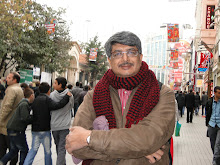This is the third part of my triology on celebration of festivals in India.
We have a long history of collective celebration of various festivals. This formed the basis of social bonding and a way of expressing gratefulness to the elements. Every element of Nature was taken as a manifestation of the Divine.
Over the years one witnessed many changes. People’s perception changed, their preferences changed, they now had a different approach to religion and spirituality. A significant change in the last century has been the development of large urban agglomerations. Urbanisation, brought in its wake a different set of all-round changes.
Here, we will look at the positive spin-offs of collective celebrations of festivals. I had listed three, viz., Janmashtami, Ganpati and Navaratri celebrations which witness large and spontaneous celebrations.
I would begin by looking at some tangible benefits that have accrued to society
Keeping traditional arts alive due to patronage of these festive groups. Artisans from far and wide make their annual pilgrimage to these places and get value for their skills. Traditional arts are kept alive and more importantly these artisans absorb the latest and assimilate them in their working.
Judicious use of surplus financial resources to run many services as
- Education - Schools, Vocational training institutes,
- Health – Clinics, Ambulance services,
- Social – Aligning with civic authorities and NGOs for work on various issues like river cleaning in Pune, use of eco-friendly material, socially responsible celebrations, post-visarjan cleaning activities.
- Cultural activities covering art, music and sports
- Religious activities like bhajan groups, religion awareness classes.
- Charitable activities – assistance to school going children, shelters for the homeless,
We have a long history of collective celebration of various festivals. This formed the basis of social bonding and a way of expressing gratefulness to the elements. Every element of Nature was taken as a manifestation of the Divine.
Over the years one witnessed many changes. People’s perception changed, their preferences changed, they now had a different approach to religion and spirituality. A significant change in the last century has been the development of large urban agglomerations. Urbanisation, brought in its wake a different set of all-round changes.
Here, we will look at the positive spin-offs of collective celebrations of festivals. I had listed three, viz., Janmashtami, Ganpati and Navaratri celebrations which witness large and spontaneous celebrations.
I would begin by looking at some tangible benefits that have accrued to society
Keeping traditional arts alive due to patronage of these festive groups. Artisans from far and wide make their annual pilgrimage to these places and get value for their skills. Traditional arts are kept alive and more importantly these artisans absorb the latest and assimilate them in their working.
Judicious use of surplus financial resources to run many services as
- Education - Schools, Vocational training institutes,
- Health – Clinics, Ambulance services,
- Social – Aligning with civic authorities and NGOs for work on various issues like river cleaning in Pune, use of eco-friendly material, socially responsible celebrations, post-visarjan cleaning activities.
- Cultural activities covering art, music and sports
- Religious activities like bhajan groups, religion awareness classes.
- Charitable activities – assistance to school going children, shelters for the homeless,
I now turn my attention to some of the intangible benefits. These are important because many do not appreciate these at the first instance but play a very crucial role in our society.
• In today’s stressful times, involvement in organizing and managing is a great cathartic experience. Youthful energies are channeled into something constructive for almost two – three weeks before the actual festival and during the festival itself.
• Experts who have tracked this social phenomenon confirm an appreciable fall in levels of violence and stress. Mental problems also show significant regression.
• Religion is still a powerful motivating factor. Sending social messages intertwined with religion are an excellent way of attempting social change. Firstly, it spreads awareness and if there is a follow-up under a respectable banner, this can be used as a potent instrument of social reformation. One such group had successfully run a “Vyasana Mukti Abhiyan” (Programme to reduce / eliminate addictions) focusing on tobacco, pan masala and alcohol addictions.
• Involvement of local groups – A group festivity celebration puts the onus of good planning and execution on the organizers. This involves large groups of people in what is essentially voluntary work. This is a sort of forced team work and with a dash of devotion thrown in does a lot to promote social harmony. I have seen this especially, during Ganpati celebrations. Over the years, volunteers develop a sense of strong loyalty to group activity, and this becomes an annual pilgrimage of sorts.
• Participation by people in these festivals is an occasion for social interaction and bonding. It is also used by groups which move from one location to another for the “darshan”. In fact, there is a custom that one should see “Eleven Ganpatis”. This is a joyous group activity and increases the “feel good” factor in us.
• Beneficial vibes from participation in “Aarti” (ritual in which light either from lamps or camphor is offered to the deity) and “Bhajan” (collectively singing praises of God) sessions. It is widely accepted that collective prayer and singing has profound healing effects on the whole group.
I have listed some of the main positive spin-offs from our tradition of collective celebration of festivals. I am sure, if one were to study this subject in detail, it could form the basis of a doctoral thesis. I wonder if any one in India has chosen to study this.
It would be very illuminating to share experiences and view points from others – not only from India but across the whole wide world.





12 comments:
Mavin, as you have rightly observed, the subject needs to be studied in detail. There are so many dimensions to it that it could form the basis of a number of doctoral thesis. But it will take a person of some courage or a foreigner to choose this somewhat infra dig subject in today's environment.
These festivals help keep the oral spiritual traditions alive. They also celebrate and highlight the great flexibility and freedom that Hinduism permits to believers who follow many different panths, sects and sub-sects, and even to "free-floaters" like you and me.
I love festivals. It breaks the monotony of life.Commercialization has taken away the fun out of festivals like Diwali, still as you said there are so many positives associated with our festivals.
Vedic Chanting has been recognised as a heritage passed on from generation to generation. The aura created in some of the temples and pandals reverberate with postive vibes. The rich pandals also undertake social service activities. As you have rightly concluded the subject is vast and exploring it would mean extensive research. Nice that you have invited readers to share experiences and view points at the end of an informative post
as you know the ganpathi festival was started by Tilak as a tool for collective social action as its motive, with a religous build to thwart the british. the fervor has changed ..now it is all about" bigger the better". if you may ask, has somebody studied this - ofcourse i know the CIA analysts may have studied this with a defence and foreign policy motive and many others may have studied with several different hypothesis and research questions. ( one should run a lexis nexis ) on this. and now the retail industry gets the maximum advantage.
the navrarti festival is another example of bringing the community together for a few days ( because mostly the guju folk were nomadic ) etc etc..
the urban way of celebrating it in 5 star hotels, sponsors etc are all with the change of times.. everything undergoes a change.. but the basic aspect of mobilization ( one can always customize it for anything they want to ) is still better than nothing at all..
#Thanks Vinod.
Festivals help you get rooted. Without roots we are of no consequence.
#Hello Prerna!!
Welcome to "My Voice".
And, may I add an occasion to celebrate life.
# Hi Gopi,
The powerful and positive vibes help calm a turbulent mind.
# Hi Anrosh
Well in Mumbai you have the Durga Puja and Navratri festivities. The only Durga Puja that I attend is at Ramkrishna Mission. The atmosphere is suffused with powerful vibes.
I love the whole idea behind the public celebration, that of taking the right to Gods from a few, and giving it to all, to the masses. Have always admired Tilak for this. Love the cultural programs and activities, including Western Music and Bollywood style dancing ;), essay writing, rangoli making, singing & poster making competitions and finally elaborate prize distribution ceremony, the kids and parents all love it. Environment Awareness, eco-friendly Ganpati, awareness about noise pollution, and the solemn devotion is heart warming, specially in growing boys (- who need direction and must be kept busy, and need it the most), and young children.
Occasionally I find some people behave very right-wing style and make a fuss, I find it annoying when these few try to take upon themselves the right to enforce rituals, but such people are everywhere.
I have avoided being in the organising committee but after reading your article....maybe next year :)
Commercialization and sponsorship can be very good, if exploited to make the festival environment friendly and to get at least one girl-child's one year's education sponsored every year..
Hi IHM,
Welcome to "My Voice"
Yes the group activities can be fun and I think we should all participate in them. (No place for cynics here). I can feel your enthusiasm through your comment.
The idea of sponsoring education for a girl child is brilliant. I hope we can do that the next year at our end.
Hi Mavin,
You have covered it quite comprehensively. The greatest reason I celebrate (or don't) festivals is because it gives me immense happiness. Personally I love the feeling of Diwali and outrightly reject any form of symbolic or ritualistic ceremonies. I do believe that group of people coming together has lot of energy - I prefer to attend a rock show, while others prefer to sing Aarti :)
Quite an insightful analysis of festivals Mavin. Kudos for the posts. Though personally I am not that religious minded, I do agree with you that public celebration of festivals does indeed have a positive spin-offs both tangibly and intangibly.
ब्लॉग रीसेशन्? जरा अप्डेट करा की!
We'll ppl here r discusing nly abt positive aspects f such celebrations totaly ignoring the actual negativity such celebrations bring with dem, jus for d sake of feel good factor for few , hwmny ppl in surtoundings actualy get disturbed troubled and caused loss , the worst part of such celebrations s that one can't even freely complaint of disturbance caused by such festives, ppl wil get hyper instantly on d one eho complaints.
Hey there! This is my first visit to your blog! We are a team of volunteers and starting a new
project in a community in the same niche. Your blog provided us
beneficial information to work on. You have done a outstanding job!
My page ... cat collars
Post a Comment